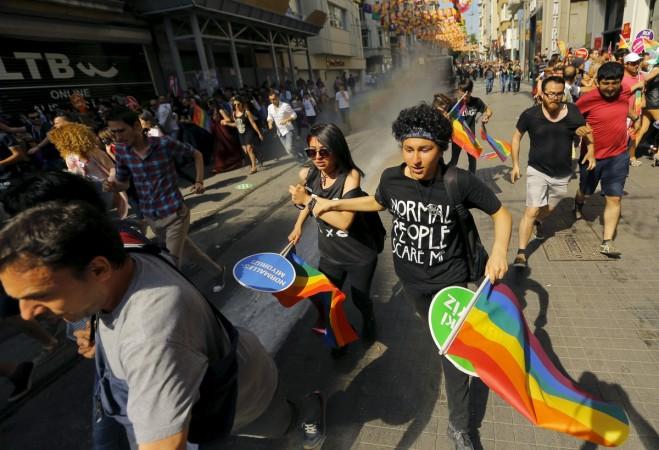
On Sunday, reports of police using water cannons and rubber bullets to break up a gay pride march in Istanbul, Turkey, during the month of Ramadan made headlines around the world.
Lesbians, gays, bisexuals and transgenders (LGBT) in the country often carry out pride marches in Istanbul in what is considered to be the biggest such gay pride in the Muslim world.
But the excess police force on peaceful civilians on Sunday in Istanbul reveals a deeper problem for the community in Turkey, where homophobia imposes severe limitations to LGBT even though homosexuality is not a crime.
The Centre for Policy and Research on Turkey released a survey titled Social and Economic Problems of Lesbian, Gay, Bisexual and Transsexual (LGBT) Individuals in Turkey, in which it highlighted the extreme discrimination faced by the community in all aspects of life.
The non-governmental organisation surveyed 2875 LGBT people through an online survey and conducted 14 focus group interviews with more than 200 people in 10 Turkish cities, including Istanbul, Ankara, Trabzon, Adana and Edirne.
The organisation said it was "not possible to conduct a nationally representative survey on LGBT individuals due to the fact that coming out is not easy for many LGBT individuals in Turkey".
Here are some startling findings from the survey.
Health:
The results showed that 43% of the participants had contemplated committing suicide at least once in their lifetime.
Shockingly, 7.2% reported that medical personnel had tried to "treat" their sexual orientation.
Education:
67.4%, ie 1312 individuals, reported that they have been discriminated during their education before the age of 18, on the basis of their sexual orientation and/or gender identity.
At least 153 said that they had to drop out of school before the age of 18 because of the discrimination, while 4.7 % said they had to drop out of their universities.
Employment:
While the survey found that LGBT were part of almost every field of employment in the country, 78.9% of the respondents said that they were not open about their sexual orientation and gender identity at work.
55.7% said that they had seen or heard that colleague at work receive negative comments and reactions because of their sexual orientation.
Discrimination against LGBT at the work place persists in Turkey, with the survey showing that 29% were treated unfairly in terms of working conditions and salary (leave, retirement etc.) because they had a same-sex partner.
Family:
More than 60% of the respondents said that not even a single member of their family know about their sexual orientation or gender identity.
While 22.2% said they did not receive any negative response from their families, 6.6% said that their family used violence against them.
Law:
Many LGBT do not take legal action against discrimination due to mistrust towards the legal system and concerns about the possible breach of their right to privacy.
Over 46% said they had faced discrimination on the grounds of their sexual orientation and/or gender identity when it came to accessing legal recourse.
Only 10% of those faced discrimination stated that they had filed an official complaint, and only 16.5% of them had received a satisfactory result.
Thus, despite homosexuality not being a crime in Turkey, LGBT in the country face discrimination in all aspects of life.
For transgender individuals in Turkey, the discrimination and problems were more acute as they are more distinguishable in public, the survey found.
















